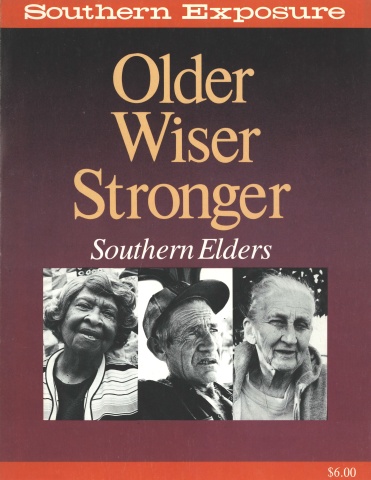The Biggest Question Mark of Them All

This article originally appeared in Southern Exposure Vol. 13 No. 2/3, "Older Wiser Stronger: Southern Elders." Find more from that issue here.
Not very long ago, a very intelligent friend in her 60s told me that as a teenager she never worried about death. By the time she and her friends had to face it, she thought, doctors would have developed a cure.
Soon after, another intelligent lady in her 80s asked me if I thought it likely that creatures from outer space would land soon, bringing with them an antidote to death.
My generation would laugh at this naivete, if we had time to laugh between gulping down mega-vitamins and rushing to the early-bird aerobics class.
It's not surprising that our intelligence sometimes fails us when we face the biggest question mark of all, the one that has no answer. These musings were set off by a recent visit to the doctor's office, in which I got the cleanest bill of health ever: low cholesterol, low-normal blood pressure, low triglycerides, lungs clear as winter mornings, heart thumping away without a hitch. I waltzed out euphoric. Five days later someone hit my car from the rear, totaled it, and, but for the grace of a seat belt, would have put my lights out for good.
After that experience, I feel some resistance to planning where I'll spend my retirement, no matter how good my checkups may be. To see ourselves as mortal, as subject to chance, and the whims of God, is the essence of wisdom. But it is also quite literally intolerable for more than five minutes at a stretch. So human beings like to imagine that we have found a cure.
Today, of course, the cure is exercise and diet — lots of fiber, no cigarettes, Transcendental Meditation, Tai Ch'i, 40 laps of the pool, zinc and iron, no cholesterol. If we can just stick to the regime, no disease will dare to kill us. When we hear that friends have fallen sick, we usually wonder what mistakes they made. Cancer, diabetes, heart disease now are symbols not of divine disfavor but of character defects. In the theology of the '80s, our bodies are temples of ourselves, and the only sins are those of the stomach and the lungs.
But amid the healthbabble, I keep thinking of bamboo. Botanists tell us that each species of bamboo has a life expectancy that is absolutely fixed. It may be 60 years, or 20, or 119, but when that year comes around, the bamboo dies — all of it. All at once. Nothing can stop it. Take a cutting from a full-grown tree; put it in a sterile lab away from all other plants; offer it sunlight and plant food and constant temperature and arias by Luciano Pavarotti. It doesn't matter. When its cousins in the wild die, your shoot will die as well.
Every organism has its limits, and nothing we can do can change them much. Or to put it another way, when the black camel decides to kneel, he knows where to find your tent. Human beings are not bamboo shoots; but we're enough like them to suggest that each individual comes into the world with some upper limit on age, set by some combination of genetics and prenatal experience. Some of us will live longer than others, whatever we do. Some of the winners will be pudgy smokers; some of the losers will be vegetarian marathoners. At its most basic level, life really is unfair.
None of this is an argument for three packs of Camels, candy bars and Coke, and crashing on the couch. Obviously if we take care of our health, our lives will be happier and more useful than if we don't. They may even be longer, though we'll never know — there's no way to repeat the experiment.
But in my unscientific way, I question whether certain kinds of exercise or food or vitamins can really extend our time very much. To me, they seem more like magical charms to ward off death — the kind of thing we laugh at "primitive" people for using. There's nothing wrong with liking to work out, but there is something kind of pathetic about thinking your Nautilus machine has the power of life and death.
Maybe this obsessive activity is harmless. But everything I know about our religious and philosophical tradition suggests that people hurt themselves by not facing their mortality as squarely as they can. And people who believe they can tame death by virtuous living can be a little insufferable when they have to deal with people who are sick or dying. When author Susan Sontag was battling cancer, she was outraged by people who suggested that the disease was caused by a flaw in her personality, and she wrote a book, Illness as Metaphor, in response. If anybody said my personality caused an illness, I would throw a book — a large, heavy one.
The question of mortality is always worth facing; in a sense, it is the only question that counts. We can't really enjoy life unless we realize it will end one day.
But the question is particularly urgent now, because the jogging generation is about to meet Geritol. All our counting of pulse rates and calories can't prevent the death rate from going up as the baby boomers age. Loss is sad enough without making it a matter of virtue. In the year 2050, will our generation be a few octogenarians limping around the parcourse, laughing at those who couldn't keep up the pace?
Tags
Garrett Epps
Garrett Epps, 35, is the author of The Floating Island: A Tide of Washington to be published in May 1985. This article appeared in March 1985 in Style Weekly in Richmond, Virginia and in The Independent, a North Carolina bi-weekly. (1985)